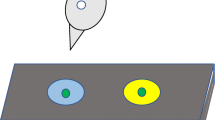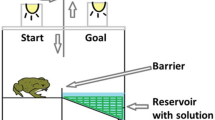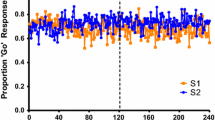Abstract
The ephemeral reward task provides a subject with a choice between two alternatives A and B. If it chooses alternative A, reinforcement follows and the trial is over. If it chooses alternative B, reinforcement follows but the subject can also respond to alternative A which is followed by a second reinforcement. Thus, it would be optimal to choose alternative B. Surprisingly, Salwiczek et al. (PLoS One 7:e49068, 2012. doi:10.1371/journal.pone.00490682012) reported that adult fish (cleaner wrasse) mastered this task within 100 trials, whereas monkeys and apes had great difficulty with it. The authors attributed the species differences to ecological differences in the species foraging experiences. However, Pepperberg and Hartsfield (J Comp Psychol 128:298–306, 2014) found that parrots too learned this task easily. We have found that with a similar task pigeons are not able to learn to choose optimally within 400 trials (Zentall et al. in J Comp Psychol 130:138–144, 2016). In Experiment 1 of the present study, we found that rats did not learn to choose optimally in 840 trials; however, in Experiment 2 we added a prior commitment to the initial choice by increasing delay to reinforcement for the choice response from a single lever press to the first lever press after 20 s (FI20 s). In a comparable amount of training to Experiment 1, the rats learned to choose optimally. Although the use of a prior commitment increases the delay to reinforcement, it appears to reduce impulsive responding which in turn leads to optimal choice.


Similar content being viewed by others
References
Ainslie G (1975) Specious reward: a behavioral theory of impulsiveness and impulse control. Psychol Bull 82:463–496
Bitterman ME (1965) Phyletic differences in learning. Am Psychol 20:396–410
Boysen ST, Berntson GG, Hannan MB, Cacioppo JT (1996) Quantity based interference and symbolic representations in chimpanzees (Pan troglodytes). J Exp Psychol Anim Behav Proc 22:76–86
Bshary R, Grutter AS (2002) Experimental evidence that partner choice is a driving force in the payoff distribution among cooperators or mutualists: the cleaner fish case. Ecol Lett 5:130–136
Bshary R, Grutter AS, Willener AST, Leimar O (2008) Pairs of cooperating cleaner fish provide better service quality than singletons. Nature 455:964–967
Doyle JR (2013) Survey of time preferences, delay discounting models. Judgm Decis Mak 8:116–135
Koepke AE, Gray SL, Pepperberg IM (2015) Delayed gratification: a grey parrot (Psittacus erithacus) will wait for a better reward. J Comp Psychol 129:339–346
Pepperberg IM, Hartsfield LA (2014) Can Grey parrots (Psittacus erithacus) succeed on a “complex” foraging task failed by nonhuman primates (Pan troglodytes, Pongo abelii, Sapajus apella) but solved by wrasse fish (Labroides dimidiatus)? J Comp Psychol 128:298–306
Prétôt L, Bshary R, Brosnan SF (2016a) Comparing species decisions in a dichotomous choice task: adjusting task parameters improves performance in monkeys. Anim Cognit. doi:10.1007/s10071-016-0981-6
Prétôt L, Bshary R, Brosnan SF (2016b) Factors influencing the different performance of fish and primates on a dichotomous choice task. Anim Behav 119:189–199
Rachlin H, Green L (1972) Commitment, choice and self-control. J Exp Anal Behav 17:15–22
Rayburn-Reeves RM, Stagner JP, Kirk CR, Zentall TR (2013) Reversal learning in rats (Rattus norvegicus) and pigeons (Columba livia): qualitative differences in behavioral flexibility. J Comp Psychol 127:202–211
Renner KE (1964) Delay of reinforcement: a historical review. Psychol Bull 61:341–361
Salwiczek LH, Prétôt L, Demarta L, Proctor D, Essler J, Pinto AI, Wismer S, Stoinski T, Brosnan SF, Bshary R (2012) Adult cleaner wrasse outperform capuchin monkeys, chimpanzees, and orang-utans in a complex foraging task derived from cleaner-client reef fish cooperation. PLoS ONE 7:e49068. doi:10.1371/journal.pone.0049068
Smith AP, Zentall TR (2016) Suboptimal choice in pigeons: choice is primarily based on the value of the conditioned reinforcer rather than overall reinforcement rate. J Exp Psychol Anim Behav Proc 42:212–220
Zentall TR, Case JP, Luong J (2016) Pigeon’s paradoxical preference for the suboptimal alternative in a complex foraging task. J Comp Psychol 130:138–144
Zentall TR, Case JP, Berry JR (2016) Early commitment facilitates optimal choice by pigeons. Psychol Bull Rev. doi:10.3758/s13423-016-1173-8
Author information
Authors and Affiliations
Corresponding author
Ethics declarations
Conflict of interest
The authors declare that they have no conflict of interest.
Human and animal rights statement
All procedures performed in studies involving animals were in accordance with the ethical standards of the Institutional Animal Care and Use Committee (IACUC) at the University of Kentucky. The procedures were consistent with the USA and State law.
Rights and permissions
About this article
Cite this article
Zentall, T.R., Case, J.P. & Berry, J.R. Rats’ acquisition of the ephemeral reward task. Anim Cogn 20, 419–425 (2017). https://doi.org/10.1007/s10071-016-1065-3
Received:
Revised:
Accepted:
Published:
Issue Date:
DOI: https://doi.org/10.1007/s10071-016-1065-3




